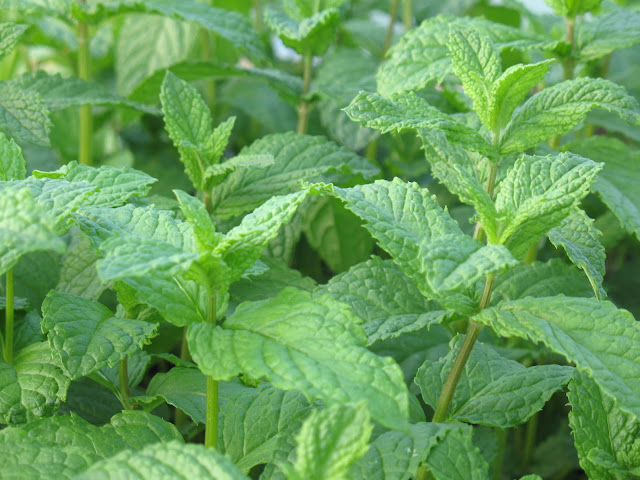Description
Mint is a popular spice, used
extensively in Indian cooking. It is an erect, branched perennial herb with
underground modified stems. The Shoots produced from these stems are four
angled, and bear oval-shaped leaves which are simple, delicate, thin, dark
green in color and fragrant.
Origin and
Distribution
Mint is a native of temperate
Europe. Ancient Romans and Greeks knew about this plant. In olden days it was
believed that Menthe, the damsel lover of God Pluto, was transferred into this herb
due the anger of Persephone, the wife of Pluto and Goddess of Wealth. Therefore
mint is commonly known as Minthae in Latin. The ancient Greek physician,
Saufarsats used mint in the preparation of various carminative medicines. Even Mohammadan
physicians were familiar with this herb. Chinese and Japanese knew this herb as
long as two thousand years. Mint has now been introduced in all parts of the
world and it widely grows in Indonesia, West Africa etc In India, mint grows widely
in Himalayan plains and Kashmir valley in a number of varieties.
Food Value
|
Mint*
|
|||
|
Food Value
|
Minerals and
Vitamins
|
||
|
Moisture
|
84.9%
|
Calcium
|
200 mg
|
|
Protein
|
4.8%
|
Phosphorus
|
62 mg
|
|
Fat
|
0.6%
|
Iron
|
15.6 mg
|
|
Minerals
|
1.9%
|
Vitamin
C
|
27 mg
|
|
Fiber
|
2.0%
|
Small
amount of
|
|
|
Carbohydrates
|
5.8%
|
Vitamin B Complex and good amount of
|
|
|
|
100%
|
Vitamin D and E
|
|
|
*Values
per 100 gms edible portion
|
Calorific
Value - 48
|
||
Mint contains plenty of
vitamins and is rich in several minerals. The fresh and dried leaves are used
for mint sauce and jelly and to flavor foods. Mint oil is used in chewing gum,
tooth paste and in confectionery and pharmaceutical preparations.
Natural
Benefits and Curative Properties
Mint is much valued as a
carminative which relieves gastric discomforts, stimulant, antispasmodic which
relieves muscle strain and stomachic for improving appetite. It forms an ingredient
of most drugs prescribed for stomach ailments because of its digestive
properties It is good for the liver and helps dissolve gravel in the kidneys
and bladder.
Digestive
System Disorders
Mint juice is a good appetizer.
Fresh leaf juice of mint mixed with a teaspoonful of lime juice and honey is
given thrice daily with excellent results in the treatment of indigestion,
biliousness, flatulent colic, thread worms, morning sickness and summer diarrhea.
According to father Kneipp, the
well-known Naturopath. “A cupful of mint tea taken every morning and evening
assists the digestion and gives a fresh and healthy appearance. The powder
renders the same service, if one or two pinches are taken daily in the food or
in water.” He also considers that mint, prepared in milk or tea and drunk warm,
removes abdominal pains.
The seeds of mint are also
beneficial in relieving severe abdominal pain due to indigestion in older
children. The child may be given a quarter teaspoonful of the seeds to chew and
swallow with water in such conditions.
Respiratory
Disorders
A teaspoonful of fresh mint
juice, mixed with two spoonful of pure malt vinegar and equal quantity of honey
is stirred in four ounces of carrot juice and is given thrice daily as a medicated
tonic during the treatment of tuberculosis, asthma and bronchitis. It liquefies
the sputum, nourishes the lungs, increases body's resistance against infection
and prevents the harmful effects of anti-tubercular drugs. It prevents the asthmatic
attacks and reduces congestion in air passages.
Oral
Disorders
Fresh leaves of mint, chewed
daily is an effective antiseptic dentifrice i.e. tooth paste. The chlorophyll
combined with other antiseptic chemicals in the mint, kills all the germs
causing harmful odor. It strengthens the gums by providing the required
nutrients and thus prevents tooth decay, pyorrhea, pre-mature fall of the teeth
etc. It also keeps the mouth fresh and improves the sense of taste in the
tongue.
Hoarseness
Gargling fresh mint decoction
with salt cures hoarseness due to shouting or singing loudly. It keeps the
voice clear if used before singing. Therefore, it is a boon to singers and
orators.
Skin
Disorders
Application of fresh mint juice
over face every night cures pimples and prevents dryness of the skin. Juice is
also applied over insect stings, eczema, scabies and contact dermatitis.
Natural
Birth-Control
In Ayurveda, powdered dry mint
is regarded as a harmless herb for birth control. It is believed that the woman
who swallows 10 grams of this powder a little before the sexual intercourse
will be free from pregnancy so long as she continues this practice. The mint
should be dried in a shady place and then powdered and bottled.










No comments:
Post a Comment